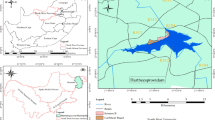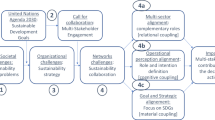Abstract
This article investigates the involvement of local stakeholders in the environmental impact assessment (EIA) processes of Ghana’s first off-shore oil fields (the Jubilee fields). Adopting key informants interviews and documentary reviews, the article argues that the public hearings and the other stakeholder engagement processes were cosmetic and rhetoric with the view to meeting legal requirements rather than a purposeful interest in eliciting inputs from local stakeholders. It further argues that the operators appear to lack the social legitimacy and social license that will make them acceptable in the project communities. A rigorous community engagement along with a commitment to actively involving local stakeholders in the corporate social responsibility (CSR) programmes of the partners may enhance the image of the partners and improve their social legitimacy. Local government agencies should be capacitated to actively engage project organisers; and government must mitigate the impact of the oil projects through well-structured social support programmes.

Similar content being viewed by others
Notes
Tullow Ghana Limited, Kosmos Ghana HC, Anadarko WCTP Company, Sabre Oil and Gas, the EO Group, and the Ghana National Petroleum Corporation.
For a thorough discussion of the various aspects of legitimacy, refer to: SUCHMAN, M. C. l. Managing Legitimacy: Strategic and Institutional Approaches. The Academy of Management Review, 20, 571-610.
References
Abrams LS (2010) Sampling ‘hard to reach’ populations in qualitative research. Qual Soc Work 9:536–550
Agrawal A (2005) Environmentality: community, intimate government, and the making of environmental subjects in Kumaon, India. Curr Anthropol 46:161–190
Albergaria R, Fidelis T (2006) Transboundary EIA: Iberian experiences. Environ Impact Assess Rev 26:614–632
Almer HL, Koontz TM (2004) Public hearings for EIAs in post-communist Bulgaria: Do they work? Environ Impact Assess Rev 24:473–493
Amegbey NA, Adimado AA (2003) Incidents of cyanide spillage in Ghana. Min Process Extr Metall 112:126–130
Anane M (2006) Lethal cyanide spill in Ghana outrages gold mining communities. In: Environment News Service, July 25 edn. Environment News Service, New York
Appah-Sampong E (2003) Public hearing within the environmental impact assessment review process. Case studies from Developing Countries: case study 9
Appiah-Opoku S (2001) Environmental impact assessment in developing countries: the case of Ghana. Environ Impact Assess Rev 21:59–71
Avram D, Kühne S (2008) Implementing responsible business behavior from a strategic management perspective: developing a framework for Austrian SMEs. J Bus Ethics 82:463–475
Boon E, Bawole JN, Ahenkan A (2012) Stakeholder participation in community development projects: an analysis of the quadripartite model of the International Centre for Enterprise and Sustainable Development (ICED) in Ghana. Community Development:1–17
Browne AL, Stehlik D, Buckley A (2011) Social licences to operate: for better not for worse; for richer not for poorer? The impacts of unplanned mining closure for “fence line” residential communities. Local Environ 16:707–725
Calvano L (2008) Multinational corporations and local communities: a critical analysis of conflict. J Bus Ethics 82:793–805
Canter LW (1996) Environmental impact assessment. McGraw-Hill Inc., New York
Collingridge DS, Gantt EE (2008) The quality of qualitative research. Am J Med Qual 23:389–395
Courtney M (2004) Public hearing on impact assessment of community legislation. Contribution from the Regulatory Impact Unit, Cabinet Office, London
Cunningham AC, Tiefenbacher PJ (2008) Evaluating the effectiveness of public participation efforts by environmental agencies: repermitting a smelter in El Paso, Texas, USA. Environ Plan C 26:841–856
Cvetkovich G, Earle TC (1992) Environmental hazards and the public. J Soc Issues 48:1–20
Detomasi D (2008) The political roots of corporate social responsibility. J Bus Ethics 82:807–819
Diduck A, Sinclair AJ (2002) Public involvement in environmental assessment: the case of the nonparticipant. Environ Manage 29:578–588
EPA (1999) Environmental impact assessment regulations In: EPA, ed. LI 1652. EPA, Accra
Esteves AM (2008) Mining and social development: refocusing community investment using multi-criteria decision analysis. Resour Policy 33:39–47
Gauthier M, Simard L, Waaub J-P (2011) Public participation in strategic environmental assessment (SEA): Critical review and the Quebec (Canada) approach. Environ Impact Assess Rev 31:48–60
Gelissen J (2007) Explaining popular support for environmental protection. Environ Behav 39:392–415
Genena T (2011) Terminal evaluation of project “capacity building in environmental impact assessment and promotion of public participation in West Asia”. UNEP Evaluation Office, Geneva
GOG (2012) 2011 Budget statement. In: Finance Mo, editor. Ministry of Finance, Accra
GSS (2008) Ghana Living Standards Survey: report of the fifth round (GLSS 5). Ghana Statistical Service, Accra
Kakonge JO (1998) EIA and good governance: issues and lessons from africa. Environ Impact Assess Rev 18:289–305
Li F (2009) Documenting accountability: environmental impact assessment in a Peruvian mining project. PoLAR 32:218–236
Mann S (2011) A critical review of qualitative interviews in applied linguistics. Appl Linguist 32:6–24
Morrison-Saunders A, Fischer TB (2006) What is wrong with EIA and sea anyway? A sceptic’s perspective on sustainability assessment. J Environ Assess Policy Manage 08:19–39
Mulrennan ME, Scott CH (2005) Co-management: an attainable partnership? Two cases from James Bay, Northern Quebec and Torres Strait, Northern Queensland. Anthropologica 47:197–213
Myers MD, Newman M (2007) The qualitative interview in IS research: examining the craft. Inf Organ 17:2–26
Myjoyonline.com/Ghana (2011) Newmont pays GH¢7 million in spillage compensation. In: Myjoyonline.com, 14 September edn. Myjoyonline.com, Accra
Nadeem O, Fischer TB (2011) An evaluation framework for effective public participation in EIA in Pakistan. Environ Impact Assess Rev 31:36–47
O’Faircheallaigh C (2007) Environmental agreements, EIA follow-up and aboriginal participation in environmental management: the Canadian experience. Environ Impact Assess Rev 27:319–342
Ogunba OA (2004) EIA systems in Nigeria: evolution, current practice and shortcomings. Environ Impact Assess Rev 24:643–660
Omofonmwan IS, Odia LO (2009) Oil exploitation and conflict in the Niger-Delta region of Nigeria. J Hum Ecol 26:25–30
Paliwal R (2006) EIA practice in India and its evaluation using SWOT analysis. Environ Impact Assess Rev 26:492–510
Pellikka J, Sandström C (2011) The role of large carnivore committees in legitimising large carnivore management in Finland and Sweden. Environ Manage 48:212–228
Peterlin M, Kross BC, Kontic B (2008) A method for the assessment of changes in environmental perception during an EIA process. Environ Impact Assess Rev 28:533–545
Reed MS (2008) Stakeholder participation for environmental management: a literature review. Biol Conserv 141:2417–2431
Suchman MC (1995) Managing legitimacy: strategic and institutional approaches. Acad Manage Rev 20:571–610
Talmy S (2010) Qualitative interviews in applied linguistics: from research instrument to social practice. Ann Rev Appl Linguist 30:128–148
Teddlie C, Yu F (2007) Mixed methods sampling. J Mixed Methods Res 1:77–100
TheGhanaianTimes (2010) Oil spill: Kosmos may pay penalty to Govt In: The Ghanaian Times. New Times Corporation, Accra
Tullow (2009a) Annex A: Consultation report of Ghana Jubilee Field Phase 1 development In. Tullow Ghana Limited, Accra
Tullow (2009b) DRAFT non technical executive summary of environmental impact statement: Ghana Jubilee Field Phase 1 development. In. Tullow Ghana Limited, Accra
Watkin L, Kemp P, Williams I, Harwood I (2012) Managing sustainable development conflicts: the impact of stakeholders in small-scale hydropower schemes. Environ Manage 49:1208–1223
Zhao Y (2010) Public participation in China’s EIA regime: Rhetoric or reality? J Environ Law 22:89–123
Zubair S, Bowen D, Elwin J (2011) Not quite paradise: inadequacies of environmental impact assessment in the Maldives. Tourism Manage 32:225–234
Acknowledgments
I wish to acknowledge the immense contribution of all interviewees, who, despite the short notice agreed to participate in this study and shared their experiences. I also want to thank Ms. Esinam Kayi for transcribing most of the interviews. The very thorough reviews from the four anonymous reviewers played a significant role in getting this article to this level and for their contribution and time, I wish to express my gratitude to them.
Conflict of interest
The author is a shareholder of Tullow Ghana Ltd.
Funding
Funding for this research was provided by the University of Ghana Business School through the Research and Conferences Committee.
Author information
Authors and Affiliations
Corresponding author
Rights and permissions
About this article
Cite this article
Bawole, J.N. Public Hearing or ‘Hearing Public’? An Evaluation of the Participation of Local Stakeholders in Environmental Impact Assessment of Ghana’s Jubilee Oil Fields. Environmental Management 52, 385–397 (2013). https://doi.org/10.1007/s00267-013-0086-9
Received:
Accepted:
Published:
Issue Date:
DOI: https://doi.org/10.1007/s00267-013-0086-9




